
Half of the corporate travellers surveyed by Sabre say their organizations don’t suggest using any travel apps, and about a third of them end up using their own preferred solutions. Although the majority of employees use mobile apps to contact the office during business trips and for emergencies, their companies don’t have the technology to track them throughout the journey and provide assistance in case of need.
There are existing solutions to address the travellers’ demand and adjust to their new behavior. You can divide these solutions into two categories:
- Independent software vendors – companies providing self-service solutions for travel expense management, booking, invoicing, support dashboards, and automating your organization’s travel management process overall
- Travel management organizations – companies, offering all the above, plus services that include access to travel agents, consultancy, custom travel program building, and more
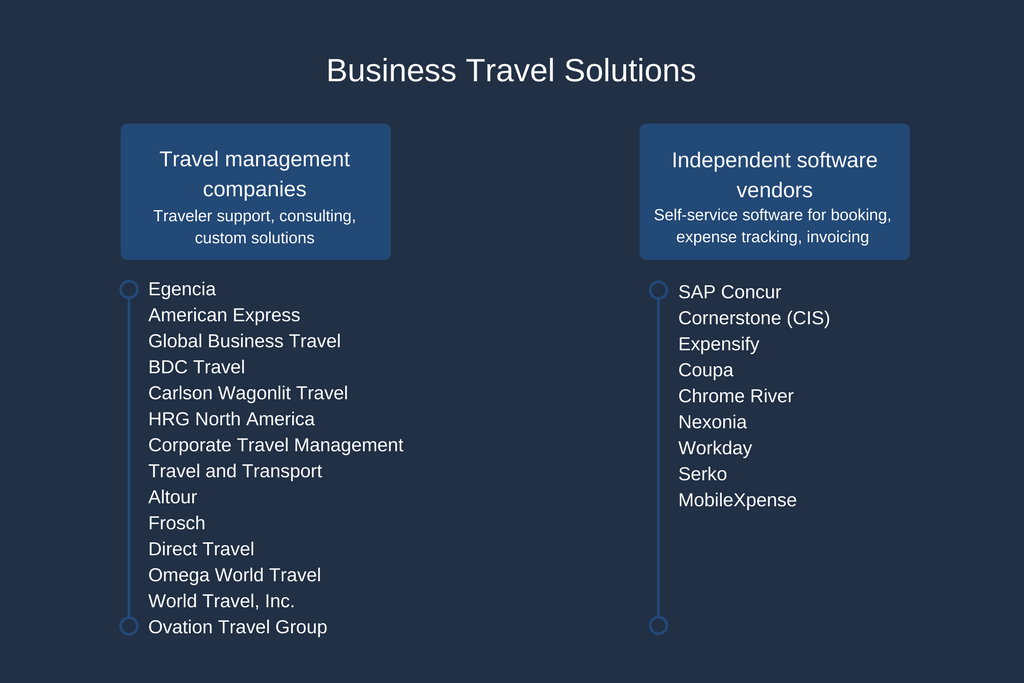
To finally keep up and optimize travel management in your corporation, start with these important digital trends in business travel.
Self-service from consumer applications to business
The rise of mobile technology and internet allowed for enhanced connectivity. We use apps to order our coffee ahead of the line or check-in for the flight from home. Travellers too are confident with making their purchases online, changing an itinerary, and booking with the help of an app or even a chatbot. Instead of calling a person in the office, they enjoy autonomy. It doesn’t mean that business travellers want to evade a corporate policy and stay independent during their trips. Rather, they’d like to control some of their travel themselves.
Corporate travel app Lola does just that. It provides smooth, personalized trip planning for people who travel a lot and uses chat as the main medium to connect its concierge and clients. Choosing and booking in this case are up to a traveler who reviews different options independent of an agent. Paul English, a Lola founder, shares, “I thought I was building a consumer company like Kayak and discovered it was business travellers that wanted chat. The second thing is that I thought we were building for chat, email, and phone. We found that people almost never want to talk on the phone.”
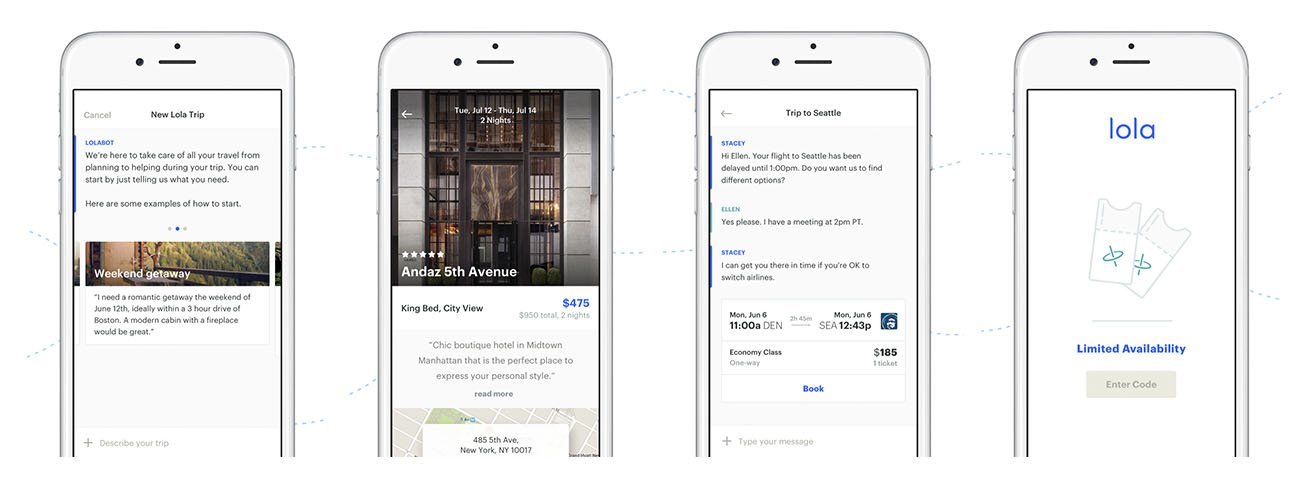
Personalized flow of trip planning via Lola
No, the role of travel managers and travel management companies doesn’t become obsolete. With more time on their hands, travel agents can research and implement new technologies, update travel policies, use analytics to explore travellers’ behavior and apply personalization in the future. Also, an employee can’t solve all travel problems using just her smartphone. A travel manager will always be there to help with disruptions and to notify about sudden changes.
Duty of care and travel risk management through technology
Duty of care is a concept meaning that a company has a moral and legal obligation to protect its employees and provide safety while they’re working in remote areas. While business travellers prefer to stay fairly independent on their trips, they need to know that someone has their back. To execute their duty of care, companies are implementing travel risk management solutions. Today, however, these measures are only concerned with preparing a traveler for the trip via education, not providing security and monitoring while they’re away.
Traveling in the past few years has been strongly associated with risk: regulation changes, strikes, terrorist attacks, and natural disasters are some of the biggest disruptors that may not only prevent a business traveler from reaching their destination on time, but also can present health or life dangers. It shouldn’t come as a surprise that 65% of travellers have more fear regarding traveling for business than they did 12 months ago. Half of them worry that their reluctance to go on business trips may harm their careers. These alarming numbers are further confirmation that having an effective and transparent risk policy is a must.
According to the 2016 survey by GBTA, 72% of companies buying travel have a risk management strategy in place. Still, 28% of interviewed companies either don’t have an established risk management plan or their employees don’t know whether they have one. Let’s uncover how organizations can use business travel technology to streamline risk management processes.
- Use real-time alerts
Travel agents should be promptly notified about any emerging risks and quickly react according to established procedures. Travel management software such as 4Site allows agents to see constantly updated information about each traveler on a dashboard and communicate with travellers in a chat to inform about changes.

Travel agents can see traveler details on a timeline and remotely handle disruptions
- Collect historical data
Recorded past disruptions and risks will help organizations evaluate dangers in the future. Then, you can filter and distribute data to different departments where people can make use of it. Using information about the weather or airport service, the system can alert to possible disruptions and act accordingly. Learn more about this and other use cases of data science in travel in our article.
- Protect third-party travellers on your behalf
Sometimes organizations need to look after contractors or partners when they’re traveling on a company’s behalf. By establishing a monitoring and communication tool, you can easily create a profile for any such person and track their status just as if they were your employees.
Even if you have an effective plan in place, you can’t leave your employees clueless about the company’s procedures in case of a disruption. Be it a simple flight delay or a serious obstruction, a traveler must know that someone is handling the issue and they won’t be abandoned. Establish a communication platform that would be convenient for both travel managers and traveling employees and confirm that they are trained to use it.
Embracing secure and convenient virtual payments
When services such as Uber started allowing clients to pay directly via an app, people quickly got used to paying with a tap of a finger. Corporate travel, however, still lags behind. Why? The survey by AirPlusnames the main reason – the lack of knowledge about the differences between credit cards and virtual paying options. Let’s give a quick explanation.
Mobile wallets such as Apple Pay or Samsung Pay use near field communication (NFC) technology to make contactless payments. You just hold your smartphone or wearable device near a terminal or another compatible device which makes the process pretty much the same as using plastic cards. Mobile wallets can store all your virtual money – corporate and personal cards, limited use cards provided for each specific vendor with a specific limit, loyalty and discount points.
There are advantages to consider for all types of payments, but let’s see how mobile payments can transform corporate travel and expense management.
- Risk and fraud prevention
People don’t have to worry about a corporate credit card being lost or stolen in travel and using their personal cards for business. From an organization’s perspective, virtual money permits the creation of virtual card numbers (VCNs) that expire after specific events or amounts spent to ensure that corporate policies are followed. This prevents theft, fraud, or simply misuse by a traveler.
- Improved expense management and reporting
Using virtual payments also allows agents to keep all travel data in one place without having to deal with multiple bills and sources of data. All expenses appear in a reporting tool in real time, can be linked to GPS, and create much more sophisticated reports. This streamlines expense management while saving both travellers’ and agents’ time.
- Paying for third-party travellers
Not all people traveling on a company’s behalf will be its employees or can be issued a corporate credit card. In this case, a manager can more easily and with no risk create a virtual card number for all contractors or employees who rarely travel.
Virtual payment technology benefits both travellers and travel managers. Employees can make quick and simple payments without having to carry cash or pay with their own money. Managers receive more accurate data and simplified expense management.
Shared economy is joining the game
Shared economy businesses are transforming the way we as a society receive and provide services. Many US adults (66.3%) are expected to use a sharing economy service this year, be it for requesting a ride, asking someone to do grocery shopping for them, or taking care of a pet when on vacation.
In the past few years, hotel room prices have gradually gotten higher and are expected to increase in 2018 as well. The surcharges and fees for services that used to be free are also hitting record highs with more and more hotels charging for Wi-Fi or an in-room safe. To reduce travel expenses, companies are searching for alternative accommodation options. Of course, we’re talking about Airbnb.
Over 250,000 companies have been using its platform for business travel since the launch of the program in 2015. A highly-functional dashboard for managing trips and traveling employees along with a growing list of business-ready accommodations helped the service skyrocket its corporate travel initiative. Handpicked homes with 24-hour check-in, wireless Internet, and a comfortable workplace are prioritized when considering a home “business-ready.”

AirBnb Business reporting dashboard
Such options go in line with the recent trend towards combining business and leisure travel – bleisure – and we have a whole article dedicated to targeting bleisure travellers for you to check out. Along with friendly hosts and a homey feeling during a long trip, employees can enjoy a much wider set of amenities from a Netflix account to a fully-functional kitchen area. Corporate travellers can truly experience the local feel and have a proper rest after a long day in a conference room.
Uber is also becoming a preferred alternative to expensive taxis and rental cars. Just like Airbnb, the transportation giant provides an activity dashboard to help manage all corporate transportation in one place, request a ride on behalf of your employee or customer for it to be ready at the hotel or an airport, and even customize your settings according to each employee’s preferences.
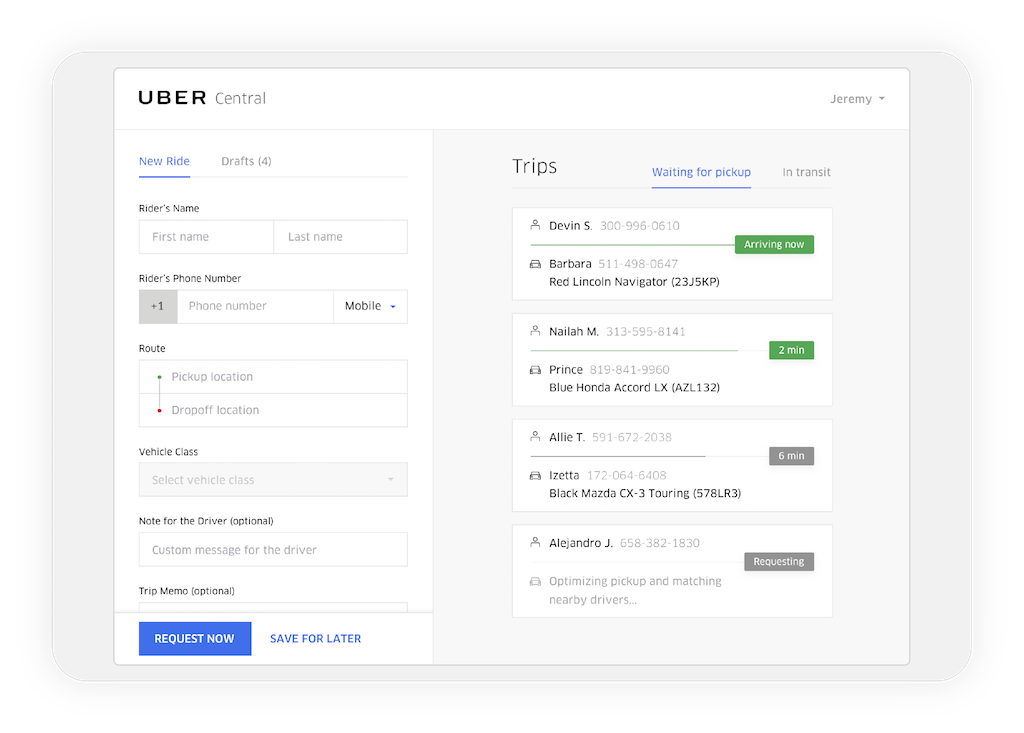
Managing business transportation on Uber
As for the flights, there are even options to skip commercial airlines and use private jets for a fraction of the price. Subscription-based services like SurfAir allow for flexible and convenient air transportation when you travel as a group or are meeting a valuable client.
Leveraging machine learning to increase value and lower costs
There’s a lot of predictability when it comes to business travel. Trips are fixed to dates of conferences, the length of stay is usually short, corporate travellers have similar demands and needs when it comes to comfortable plane seats and hotel rooms. You can learn a lot about people from the same category if you collect and analyze all data you receive from them. And the better you do it, the more satisfied the future travellers will be. There are numerous applications of data science in travel, and when it comes to business travel, there’s no exception.
- Preventing disruptions
Recently, Google Flights started predicting delays using a machine learning algorithm. While this tool will be useful for all types of travellers, in the corporate world, such disruptions can cause significant financial losses and should be dealt with promptly and effectively. By being alerted about possible turmoil, travel agents can adjust the schedules and trip details, for instance, extend a hotel room booking without making an important client wait in an airport.
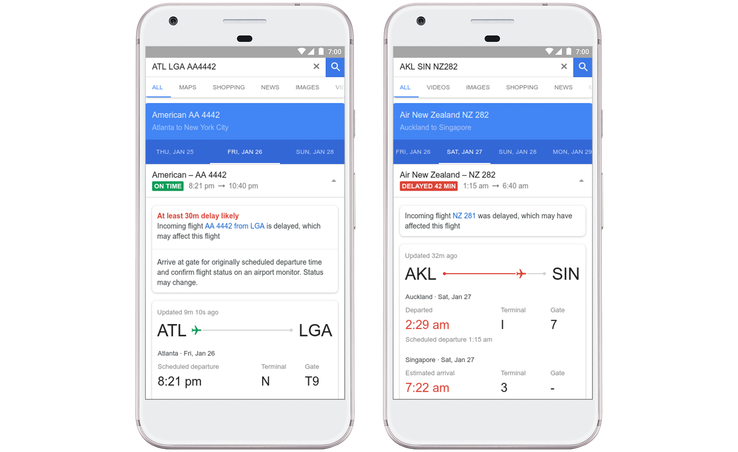
Google Flights delay prediction
- Personalisation
The boom of chatbots has been especially prominent in the travel industry, allowing people to deal with stressful trip planning using AI-enabled smart assistants. Such technologies learn from your past choices and make better suggestions the more you use them. They also collect data from all other users, which helps segment and provide more targeted options. For example, travel assistant Mezi keeps living profiles of each traveler and automatically updates them depending on user behavior. This allows agents to provide more personalized services. Learn more about customer personalization in travel in our article dedicated to that topic.
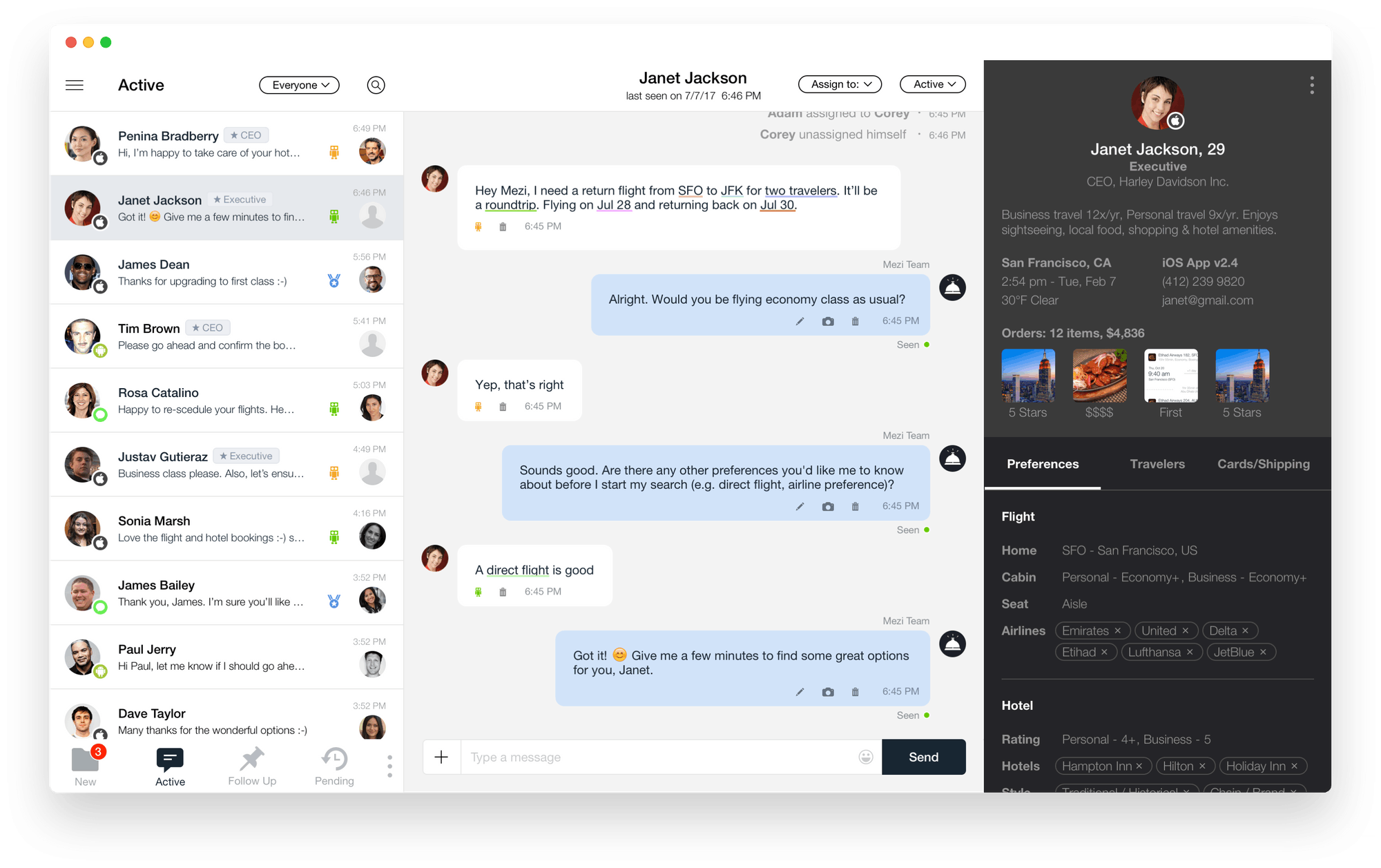
AI-enabled Travel Dashboard by Mezi
- Expense and time saving
Not only does machine learning help predict delays, it also can provide insight on future travel prices. By analyzing historical data, algorithms provide accurate forecasts about the drops or spikes of flight and hotel prices depending on demand, seasonal trends, and other factors. Analytics-based software like one that AltexSoft built for Fareboom allows agents to plan days, weeks, or months ahead and save time and money.
Overcoming the digital divide
These days, corporate travel is struggling with solving problems that the current technological landscape can help resolve. The boosted prices for stays, unstable natural and political environments, travellers’ demands – all these factors affect how companies and their employees do business.
The main takeaway here is that technology doesn’t exist to replace travel managers and automate business travel altogether. In fact, it empowers agents with tools enabling them to reduce risk and stress for corporate travellers. Utilizing services and tools will bring faster and more efficient solutions, freeing time for strategic and analytical decisions.




















